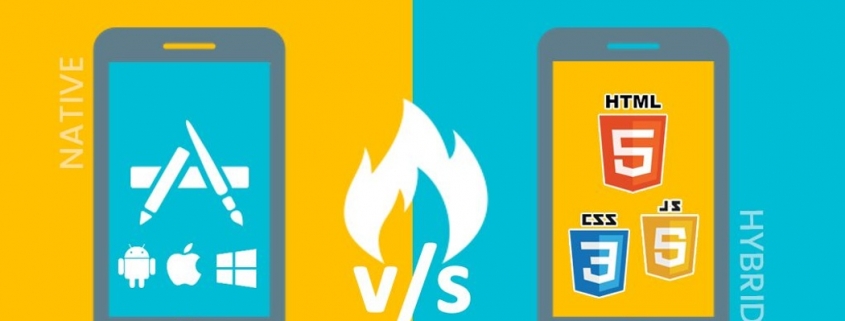Native vs Hybrid App Development: Which One Should You Choose?
Smartphones and tablets are practically worthless without the apps that run on them. Since the emergence of smartphones, developers are seeking ways to deliver the best types of mobile applications for users to download.
The rise in mobile app popularity is evident by simply looking at the latest market data reports. According to Statista, mobile phone users downloaded a total of 178.1 billion apps globally in 2017. This figure is expected to surge to 258.2 billion in 2022.
As more and more people are glued to their smartphones, companies and entrepreneurs are scrambling to establish a connection to mobile users by utilizing one of the two types of app development protocols – Native or Hybrid.
The question is which one should your company or start-up choose?
Here is a detailed walkthrough on Native and Hybrid apps as well as their pros and cons.
What are Native Apps?
Native mobile apps are created for a specific device/platform. These often times include Android, iOS, Windows, and Blackberry. Mobile app developers often use the software development kits (SDK) of certain hardware platforms, software frameworks, or operating systems. These applications are developed using the following programs:
- Objective-C or Swift for iOS
- Java or Kotlin for Android
- C# or .NET for Windows Phone
Advantages of Native Apps
- Rich user experience – App designers and developers can focus on customizing the app’s functionality to a specific platform with its language, specific elements, and set gestures. All these aspects enable developers to achieve a sense of unity and let users navigate through the interface more intuitively. Moreover, native applications can also extensively use offline mode capabilities.
- High performance – An application created and optimized for a specific platform will have a high level of performance. Since the developers “speak” using the language of the device, they can deal with the battery and memory consumption issues to achieve the best results.
- Better security – Native apps can take full advantage of the built-in security features of a device’s platform and operating system(OS). Moreover, native apps have the privilege of obtaining the performance enhancement updates of the OS.
- Full functionality – Native apps have full access to databases and hardware features of a device. Moreover, their functionality will not get compromised by plugins or any other third-party programs or tools.
- Can Run Offline – Native applications don’t need an Internet connection to run. Since they are installed within a device, they can work anywhere as long as the device is functioning properly.
Disadvantages of native apps
- Higher development costs – The development process of a native app is complicated and requires the participation of many qualified development team members.
- Longer development timeframe – Native apps generally need more time to be completed and launched, mainly if you’re targeting to launch apps for different platforms at the same time. You may choose simultaneous development if you need apps for Android, iOS or Windows Phone.
What are Hybrid Apps?
Hybrid apps are created as a single app but can run on different platforms, meaning this application acts like a native app but is developed using HTML, CSS, and Javascript. It is basically a web-based program stored in a native app shell connected to the device. Because of this feature, it behaves very similarly to a native app.
Just like Native apps, users can download them from a certain platform’s app store (Apple App Store for iOS and Google Play Store for Android).
Advantages of Hybrid Apps
- Ability to work across multiple platforms – Its capacity to run on different platforms makes it appealing to many stakeholders. Hybrid apps can run both Android and iOS, even with just one code base. Unlike native apps, there is no need to build an app for each platform.
- Faster to build – Creating a hybrid app is far less time-consuming compared to native ones as developers don’t have to create a separate programs for each platform.
- Easier to adjust and update – Because there is only a single codebase, developers do not have to work with each platform separately to make adjustments and updates of various elements. Often, the change can be applied to all platforms. Updates related to bug fixes and enhancements are better implemented in hybrid applications. Users do not need to download the latest version of your app manually through app stores to get rid of an annoying bug that has appeared for quite some time. If any problem takes place on a page loaded from the server, developers can fix that quickly, and users will get the updated or corrected version the next time they launch the app.
- Cheaper to build – Developers can create hybrid applications that can run on both iOS and Android in just about the same time required to build one native app for another platform. This shorter development time tends to make the final cost of the app cheaper.
Disadvantages of Hybrid Apps
- Needs Internet connection(sometimes) – Hybrid apps are essentially websites displayed as an app. Thus, users usually need a constant internet connection to access the full range of its features. Moreover, hybrid apps often take more time to load all their elements so some work slower. Because of this feature, hybrid applications are best suited for content-oriented apps, which are not overloaded with complex functions.
- Limited capabilities – Hybrid applications can rely heavily on plugins to be able to access the built-in features of a particular device. In time, these plugins get outdated or unreliable/unstable. Also, developers may need to come up with plugins on their own when there are no ready-made solutions to access a specific part of the devices functionality.
- Slightly compressed user experience – Because of the cross-platform operability, the user experience of hybrid applications can be less than stellar since it should run using the interface of both iOS and Android platforms. If the app focuses on Android users, the experience would be worse for iOS users and vice versa.
- May require native app developers – Hybrid app development still falls short in addressing a variety of functional problems for native development. You may still need a native developer as a member of your development team to create a quality product.
Summary: Which one should I choose?
Native apps work best if you need applications that require full functionality, speed and security. Apps with advanced features like banks and e-commerce sites will work better if developed under the Native approach. However, if you want an app where you need to update your content frequently, such as ones for blogging, the hybrid version is better. Hybrid apps are usually the way to go for start ups due to lower costs and faster development times but it’s completely up to you in which approach will be the best for your specific project.
Sources:
https://codeburst.io/native-app-or-hybrid-app-ca08e460df9
https://clearbridgemobile.com/mobile-app-development-native-vs-web-vs-hybrid/
https://appinventiv.com/blog/seven-reasons-native-app-development-better-solution/
https://techjury.net/stats-about/mobile-vs-desktop-usage/
https://hackernoon.com/native-app-development-vs-hybrid-app-development-dd83122a738c
https://www.cleveroad.com/blog/native-or-hybrid-app-development-what-to-choose








